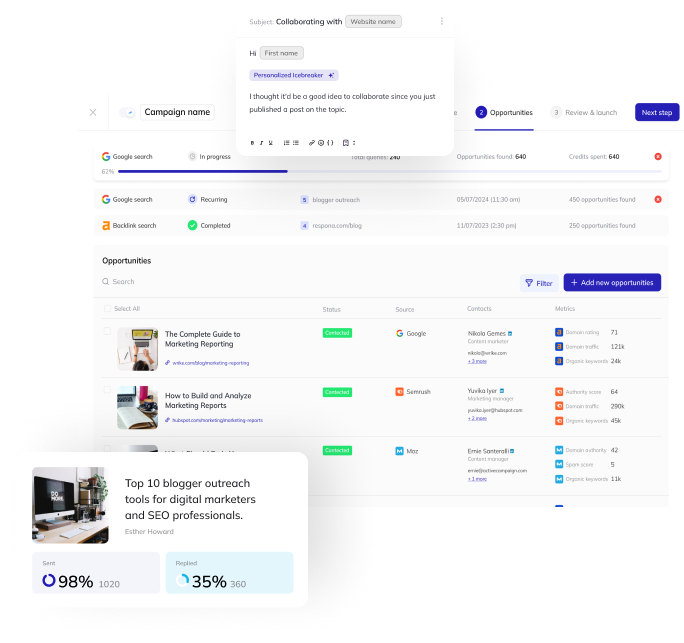Reciprocal links are more than just a simple exchange agreement between two sites.
Some professionals believe that, nowadays, it’s almost inevitable that you’re going to receive a link without giving a link back.
If that’s the case, then link exchanges should be on the rise and reciprocal link building is shifting towards a “give, then ask” approach.
But, isn’t that against Googles Guidelines?
In this guide, you’re going to learn what a link swap is and if it can affect your website’s search engine optimization (SEO).
Let’s get into it.
Link building cheat sheet
What Are Reciprocal Links?
When we talk about reciprocal links, we’re simply talking about mutual links that are exchanged between two site owners. Website A links to website B, and vice versa, typically within a short period of time.
In other words, you’re getting links from other people in exchange for linking back to their pages or resources from the content you’re creating for your own website or the guest posts you might be writing on other web sites.
We’ll cover more on that a little further down in this post.
Let’s get into a bit more detail about reciprocal links.
Private Blog Networks (PBNs)
Since we’re talking about excessive link exchange practices, we can’t miss covering Private Blog Networks (PBNs), which used to be a popular black-hat link building technique back in the 00’s.
In fact, we’re starting our presentation of the history of link exchanges with PBNs.
The way PBNs worked was that someone was buying authoritative, old domains and started adding content into them again.
That content was usually full of hyperlinks to their main site, thus boosting its search engine ranking and referral traffic.
In short, PBNs were one of the first ways of reciprocal linking.
This tactic was working up until the early 00’s when Google updated its guidelines and many websites that were using it or other spammy techniques vanished.
We need to stress that such a practice is against Google’s guidelines which basically means that marketers that are still practicing it have high chances of getting penalised and lose their SERP rankings.
In other words, today PBNs are considered to be black-hat link building since excessive exchanges of links is a red flag for the search engines.
Links-as-a-currency
From PBNs we went to treating icoming links as a kind of digital currency.
Given the importance of having quality links linking back to your pages, and after Google started penalizing sites that were being spammy in order to acquire links, selling and buying links was – and in some cases it still is! – a practice that many SEO specialists are making use of.
In 2019, SparkToro conducted an SEO survey about the most important Google ranking factors.
Factors in relation to links were ranked high by the SEOs.
An example is illustrated in the following visual:

Over 1,500 SEO professionals have ranked links from high quality sites and pages as the second most important ranking factor.
This leads to many sites either selling links to others that want to increase their website traffic or marketers sending outreach emails asking to buy links or sending a reciprocal link request.
An Ahrefs study that was initially conducted in 2016, and then repeated in 2018 to include more niches, investigated four hundred and fifty sites in nine different competitive niches.
Ahrefs reached out to popular sites of different niches, including:
- Fashion
- Travel
- Weddings
- Photography
And found that there were, indeed, a number of blogs that were willing to sell links.
Have a look:

As you can see, in 2018 there were still 12.6% of blogs selling links.
Overall, we can say that link building can totally be considered a digital currency because, in most cases, it works in terms of increasing a site’s growth and traffic.
However, there are some white-hat link building strategies that anyone could follow and avoid risking penalization by Google.
But before we get there, let’s talk about link exchanges.
I’ll link to you, you’ll link to me
Our reciprocal link exchange timeline ends up at a modern phenomenon I’m sure you’re well aware of.
The “I’ll link to you, you’ll link to me” situation!
How many times have you got an email that looks something like this:

Nowadays, there’s a large number of people that are going to ask for a link back instead of money.
In fact, a reciprocal links Ahrefs study showed that 73.6% of the study’s sample sites have reciprocal links:

Asking for a link back instead of money is definitely better, but can still be avoided and we’re going to examine some alternatives a little further down in this post.
Link building or linking back to another website should be guided by the notion of adding value to the content you’re putting out there and generally creating high quality content.
In other words, when you’re giving something – i.e. a link – you shouldn’t necessarily expect to get something in return.
Now, let’s see if reciprocal links can really hurt your SEO.
Can Reciprocal Links Hurt Your SEO?
You now know what reciprocal links are and where they started.
We haven’t yet answered the burning question: can reciprocal links hurt your SEO?
Truth is, reciprocal links can be hard to locate by Google and that’s why they’re still being used, even though they often overstep the bounds of ethical marketing strategies.
To put it simply, excessive reciprocal linking can definitely hurt your SEO.
However, there are some cases one can use their common sense for and make sure the reciprocal backlink building is not violating any guidelines, but is indeed adding value to the content readers are consuming.
Before we get any further, let’s have a look at Google’s Webmaster Guidelines what is a link scheme and link farm.

What we see here is that Google informs users of the dangers that may occur when someone might try to game PageRank or any site’s Google rankings on search result pages.
More specifically, any sort of technique that aims to manipulate inbound links to your own site can lead to penalization from Google, which basically means downgrading your site in the search results or, in more serious cases, de-indexing it altogether.
Some moves that can seriously have a negative impact on your SEO are:
- Selling and buying incoming links that pass PageRank, including exchanging links for money, goods or services
- Excessive reciprocal linking and link partner pages that present low quality content and are created merely for cross-linking purposes
- Using automations, instead of manual action to generate links back to your site – for example, using a automated SEO services for link acquisition or a black-hat SEO company
And so on and so forth.
We therefore understand that many reciprocal linking practices fall under link schemes, in terms of Google’s Webmaster Guidelines on the topic.
Websites that perform such tactics might be diminished in the search results or get a significant decrease in their visibility.
Let’s get into building backlinks that doesn’t require link exchanges and other tactics that might put you into the unpleasant situation of not being able to locate your own site in the search results.
You should schedule a regular SEO audit to remove or disavow any toxic backlinks.
How to Build Backlinks by Staying Away From Link Exchanges
Saying that reciprocal links might be a bad thing for your business without giving you an alternative wouldn’t be helpful, right?
In this section, we’re going to discuss five ways a website owner can build links that add real value to their audience and are not against Google Webmaster Guidelines.
Let’s get into the first method.
Method #1: Guest blogging
Guest blogging is definitely a good idea when it comes to acquiring links and increasing your organic traffic.
What is guest blogging?
Guest blogging is a link building strategy and content marketing technique.
More specifically, guest blogging refers to the activity where a blogger writes original content for someone else’s blog or third party website in order to raise awareness of their product or service, thus promoting their brand.
When should you use guest blogging?
Brands and individuals should use guest blogging when they want to spread the word about their brand through white-hat digital marketing tactics, which basically means that they’re creating original, high-quality content that actually informs readers and doesn’t try to game Google’s algorithm.
To give you a bit more context on this, have a look at a 2017 Google update that refers to guest posts, syndicated posts, and contributor posts.

We therefore understand that, when it comes to guest blogging, there are a few key factors you should totally be aware of, including the SEO metrics – e.g. the Domain Authority (SEO metric by Moz) – of the site you’re publishing your content on, as well as the originality of your content.
Author’s Tip: To identify websites with low site authority you can use a link checker (AKA backlink checker) such as Ahrefs, SEMrush or Moz – it is not a metric available in Google Analytics.
Additionally, you should steer clear of giving numerous outbound links (AKA outgoing link or external link) to low-authority sites, or using irrelevant anchor texts that don’t fit your content and can hurt your reputation.
These can make your content appear built for link spam and lead to the audience losing trust in your brand and the content you’re producing.
Instead, you should be focusing on publishing content that’s linkable and will naturally make people want to read your content, share it, and use it as a resource to back up their stories.
All in all, we can say that guest blogging is an inexpensive way to acquire natural link types in a white-hat manner.
Relevant resource
Guest Blogging: A (Complete) Step-by-Step Guide for 2021
Moving on.
Method #2: Content promotion
The second way of building links without having to exchange links is through content promotion.
What is content promotion?
Content promotion, as its name implies, is the process of promoting your content to prospects.
How?
By distributing content, for example your blog posts and other valuable resources yourself or your team might be writing through social media, PR outreach, influencer outreach, and so on and so forth.
In general, content promotion can be a successful link building strategy (that should be part of your overall SEO strategy) when it includes a multi-channel approach and starts with amazing, related articles.
When should you use content promotion?
Using content promotion might sound like an easy task but, in fact, it’s a strategy that requires devotion and real effort.
Reaching out to a number of prospects in order to promote your content can be extremely difficult, especially if your content is not valuable.
In other words, our advice would be to use content promotion only after you’ve actually worked really hard at producing killer content.
This way, acquiring backlinks is only a byproduct of your content efforts.
As simple as that!
Relevant resource
Content Promotion: The What, Why & How Behind It (2021)
Keep reading to find another tactic that can boost your SEO.
Way #3: Be a guest on podcasts
Being a guest on podcasts is yet another thing you could do to build links back to your site without having to go through the shady “I’ll scratch your back if you scratch mine” strategy.
How can you build backlinks with podcasts?
Building backlinks by being a guest on a podcast might make you doubtful at first glance.
However, it can be explained by the fact that when you’re participating in other peoples’ podcasts, you’re basically expanding your network and increasing your chances of a bigger audience getting to know your work.
In other words, you’re helping the audience consider your services and your site as a valuable and useful source of information.
This can ultimately lead to people linking back to your homepage of other resources organically, because they liked what you said on this or that podcast episode.
When should you use this tactic?
We think being a guest on podcasts can be incredibly beneficial for podcast hosts; this strategy can help them increase their podcast network and establish themselves as experts in the industry.
Additionally, participating in popular podcasts can be very helpful for bloggers and pretty much anyone who has deep knowledge of the industry and wants to share that knowledge with a big audience.
Relevant resource
Podcast Marketing: How to Promote a Podcast In 2021 [Guide]
Moving forward to the next one.
Way #4: Arrange expert roundups
After having discussed content promotion and guest blogging as ways to build quality backlinks to your website without using reciprocal links, we also need to mention expert roundups.
What is an expert roundup?
An expert roundup is a blog post that requires the involvement of a number of industry experts that share their opinions and expertise on a specific topic.
Here’s an example:

As you can see, this is a blog post that’s invited 21 experts to share their opinion about building an online community.
The roundup is created to share valuable insight with readers while also bringing together over 20 professionals that definitely know a thing or two about online communities.
Having so many people featured on your website can result in social shares (which is also a positive signal for search engines like Google) and, of course, backlinks as people will feel inclined to link back to the piece of content they’ve contributed to.
In fact, as you can see from the screenshot below, this piece of content has backlinks from 25 referring domains, according to Ahrefs.

Not bad, right?
When should you use expert roundups?
You should arrange SEO expert roundups when you’re interested in bringing together and featuring top professionals in your niche.
This will give you the opportunity to expand your network by reaching out to those experts and establish a relationship with them, as well as provide your audience with valuable content that’s also linkable.
Relevant resource
Link Roundups: Learn How to Get Quality Links Using Them
Let’s get to the last way we have for you.
Way #5: Use HARO (Help a Reporter Out)
The final way of getting the link juice when authoritative sites link back to your site is via HARO.
What is HARO?
HARO is an online service that connects journalists with sources, experts, and members of their audience that might have knowledge of a specific topic the journalist is interested in.
In other words, HARO is where journalists go when they’re looking for expertise they want to include in their content.
When should you use HARO?
HARO is a great opportunity to expand your network by helping out a journalist who’s looking for support and expertise to enhance their content.
Being a source in the HARO database basically means that you’re able to share your expertise, thus promoting yourself and if relevant your own brand.
In terms of link building, providing a journalist with valuable content you might have already published on your blog will give them the chance to back their stories up with data and research.
Put another way, they’ll be thrilled to link back to your site if they can find useful and rigorous content there.
If you’re a proud site owner then go ahead and share your knowledge and content with a wide range of people.
Relevant resource
What is HARO & How Does It Work? Complete Guide for 2021
We’re now done talking about the five things you could do to build an ethical link building strategy that can only benefit, and definitely not hurt your SEO.
Let’s close this post up with some final thoughts.
Link building cheat sheet
Now Over to You
There you have it.
You now know what reciprocal links are and that they’re not the only way to build white-hat links for your website.
Regardless of how reciprocal links are perceived by search engines like Google, the concept of link building shouldn’t entail an exchange to work.
After all, the point of linking back to a resource isn’t to get something back, but to give because you’ve received something valuable or because you find the linking web page or site to be really useful and insightful.
In that context, if your link prospects feel that they have to ask something from you, then there might be something wrong with your own site — it may not be useful enough to stand on its own.
And, of course, that should be a bit worrisome to you.
When you feel confident enough with your content, then you won’t need link exchanges or any other tactics that violate Google’s guidelines.
Looking to start building your own links?
Then you might want to take Respona for a test drive.
Just start your 14-day free trial and see what Respona can do for you.



![2455 Guest Posting Sites for 2024 [Updated List]](https://respona.com/wp-content/uploads/guest-posting-sites-1024x683.jpg)



